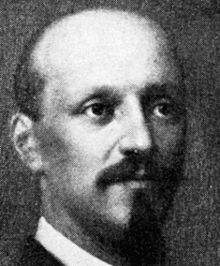Rodolphe Weck-Bussy
Rodolphe Weck-Bussy (born March 1, 1826 in Friborg ; † September 17, 1861 ibid) was a Swiss politician and State Councilor of the Canton of Friborg .
Life
Weck-Bussy was a Catholic, from Freiburg , Bösingen and Pierrafortscha , from a family of the privileged citizens of the city of Freiburg. His parents were François Weck, Grand Councilor (1814–1830, 1837–1847), Oberamtmann von Murten and appellate judge (1831–1847), and Pauline nee. Fontaine, from a wealthy merchant family, niece of Canon Fontaine. Rodolphe was the younger brother of Louis and he married Marie-Anne Vevey-Bussy in 1852, from a family of large landowners in the Broye district . Her son Romain was Ammann von Freiburg (1919–1922), her grandson Bernard was a State Councilor (1919–1946).
After attending the St. Michael College (1837–1844), Weck-Bussy led the life of a gentleman farmer who managed his large estates. Friendly to the Sonderbund , he did not hold any public office under the radical regime. In December 1856 he became a councilor for the Sense District . In the State Council elections of June 4, 1857, he was only elected after Fracheboud had turned down the office and received only 37 of 73 votes. As the only staunch conservative in a team of moderate people, he headed the finance department (1857–1861) and reorganized the offices of the State Treasury (1860). He had to implement Schaller's railway policy and support the Lausanne – Friborg – Bern route , no matter what the cost. Since the construction costs rose from 26 to 42 million francs, he had to persuade the Grand Council, which was split on this matter, to grant a loan of 16 million francs, an amount that was then made available to the Lausanne-Friborg-Berne railway company (18. June 1860).
The task was beyond his power and he died on September 17, 1861, at the age of 35, at a time when railroad finance was the main concern of the authorities and the population. His successor was an important political matter. Weck-Bussy was a staunch conservative or “special bundler”. Initially isolated in the government, he was supported by Frédéric Vaillant from 1858 .
literature
- Georges Andrey , John Clerc, Jean-Pierre Dorand et Nicolas Gex: The Freiburg Council of State: 1848–2011. History, organization, members . Editions La Sarine, Freiburg 2012, ISBN 978-2-88355-153-4 .
Web links
- Jean-Pierre Dorand and CN: Weck [-Bussy], Rodolphe de. In: Historical Lexicon of Switzerland .
| personal data | |
|---|---|
| SURNAME | Weck-Bussy, Rodolphe |
| BRIEF DESCRIPTION | Swiss politician and State Councilor for the Canton of Friborg |
| DATE OF BIRTH | March 1, 1826 |
| PLACE OF BIRTH | Freiburg |
| DATE OF DEATH | September 17, 1861 |
| Place of death | Freiburg |
